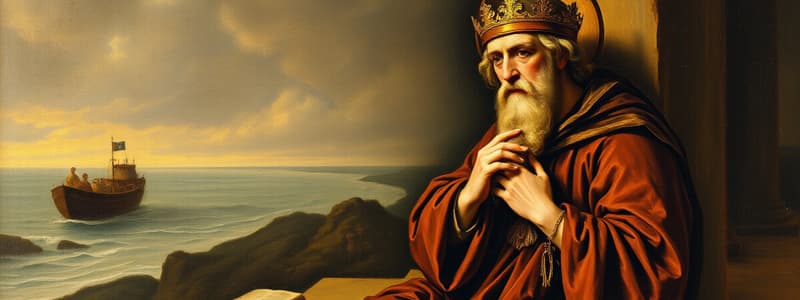Podcast
Questions and Answers
Which of the following individuals is referred to as 'my other half' in the Confessions of St. Augustine?
Which of the following individuals is referred to as 'my other half' in the Confessions of St. Augustine?
- Evodius
- Alpius (correct)
- Licentius
- Possidius
Cicero's book, Hortensius, played a significant role in St. Augustine's conversion.
Cicero's book, Hortensius, played a significant role in St. Augustine's conversion.
True (A)
Which individual from Tagaste paid for St. Augustine's studies in Carthage?
Which individual from Tagaste paid for St. Augustine's studies in Carthage?
Romanus
St. Augustine was heavily influenced by the sermons of Bishop _____ of Milan.
St. Augustine was heavily influenced by the sermons of Bishop _____ of Milan.
Match the following individuals with their descriptions:
Match the following individuals with their descriptions:
In which year did St. Augustine convert to the Catholic Faith?
In which year did St. Augustine convert to the Catholic Faith?
St. Augustine was born in Africa.
St. Augustine was born in Africa.
Who was responsible for St. Augustine's conversion?
Who was responsible for St. Augustine's conversion?
St. Augustine was ordained a priest at __________.
St. Augustine was ordained a priest at __________.
Match St. Augustine's family members to their descriptions:
Match St. Augustine's family members to their descriptions:
What was St. Augustine's profession before his conversion?
What was St. Augustine's profession before his conversion?
St. Augustine's father, Patricius, became a Catholic during his life.
St. Augustine's father, Patricius, became a Catholic during his life.
What did St. Augustine publish in 426?
What did St. Augustine publish in 426?
What philosophical influence is Saint Augustine known to be radically influenced by?
What philosophical influence is Saint Augustine known to be radically influenced by?
Saint Augustine was a bishop in Hippo during the early days of the Roman Empire.
Saint Augustine was a bishop in Hippo during the early days of the Roman Empire.
What is the name of Saint Augustine's work that is often regarded as the first Western autobiography?
What is the name of Saint Augustine's work that is often regarded as the first Western autobiography?
Saint Augustine was born in the city of ______.
Saint Augustine was born in the city of ______.
Which of the following concepts did Augustine frame?
Which of the following concepts did Augustine frame?
Saint Augustine was opposed to the belief that people can choose to be good without divine aid.
Saint Augustine was opposed to the belief that people can choose to be good without divine aid.
Match the following terms related to Saint Augustine with their descriptions:
Match the following terms related to Saint Augustine with their descriptions:
Saint Augustine's feast day is celebrated on ______.
Saint Augustine's feast day is celebrated on ______.
Flashcards are hidden until you start studying
Study Notes
Life and Impact of Saint Augustine
- Born on November 13, 354, in Tagaste, present-day Souk Ahras, Algeria.
- Renowned philosopher and theologian; pivotal figure in the evolution of Western Christianity.
- Influenced by Platonic doctrines, he introduced concepts such as original sin and just war.
- Contrasted the spiritual "City of God" with the material "City of Man" during the decline of the Roman Empire.
- Conversion to Christianity led to a prominent role as Bishop of Hippo; opposed Pelagianism, emphasizing divine aid for salvation.
- Authored "The Confessions," considered the first Western autobiography, significant in theological discourse.
- Recognized as a Doctor of the Church; canonized as a saint in Roman Catholicism, Anglicanism, and the Eastern Orthodox Church.
- Celebrated annually on June 15 in the Orthodox tradition, though some view him as heretical due to the "filioque clause."
Key Dates in Augustine's Life
- 365: Received secondary education in Madaura following his father's death.
- 370: Moved to Carthage and began studies; influenced by Cicero's writings.
- 373: Became a Manichean; returned to Tagaste as a teacher of Grammar.
- 385: Transitioned to teaching rhetoric in Rome; aimed for a cosmopolitan lifestyle.
- 386: Significant conversion experience in Milan; profound influence of St. Ambrose.
- 387: Baptized by St. Ambrose on Easter; decided to return to Africa.
- 391: Ordained priest at Hippo, established an Augustinian monastery.
- 395: Became Auxiliary Bishop of Hippo.
- 396: Became the residential Bishop of Hippo and founded a third monastery.
- 426: Published "The City of God."
- Died on August 28, 430.
Personal Relationships and Influences
- Saint Monica: His mother, a devout Christian whose prayers and example significantly influenced Augustine's conversion.
- Patricius: His father, a pagan, who later converted to Catholicism influenced by Monica.
- Melania: His concubine and mother of his son, Adeodatus; returned to Africa and entered religious life after Augustine's conversion.
- Adeodatus: His son, notable for his intelligence, died in his teens.
- Companions: Close friendship circle included Alpius, Licentius, Trigetius, and Evodius, who lived communal life and contributed to Augustinian ideals.
- Influencers:
- Cicero: His writing spurred Augustine's intellectual awakening.
- St. Ambrose: Provided pivotal guidance and inspiration leading to Augustine's conversion.
- Faustus: Manichean leader whose teachings ultimately led Augustine away from Manicheanism.
- Romanus: Benefactor who funded Augustine's education, fostering future educational endeavors.
Theological Contributions and Legacy
- Promoted the idea of Papal Supremacy within the Church.
- His works shaped Christian theology, particularly regarding salvation and grace, influencing both Catholic and Protestant thought.
- Viewed as a theological father of the Reformation, impacting teachings on grace among Calvinists.
- The Augustinian religious order directly derives its name and principles from his life and teachings.
Studying That Suits You
Use AI to generate personalized quizzes and flashcards to suit your learning preferences.



